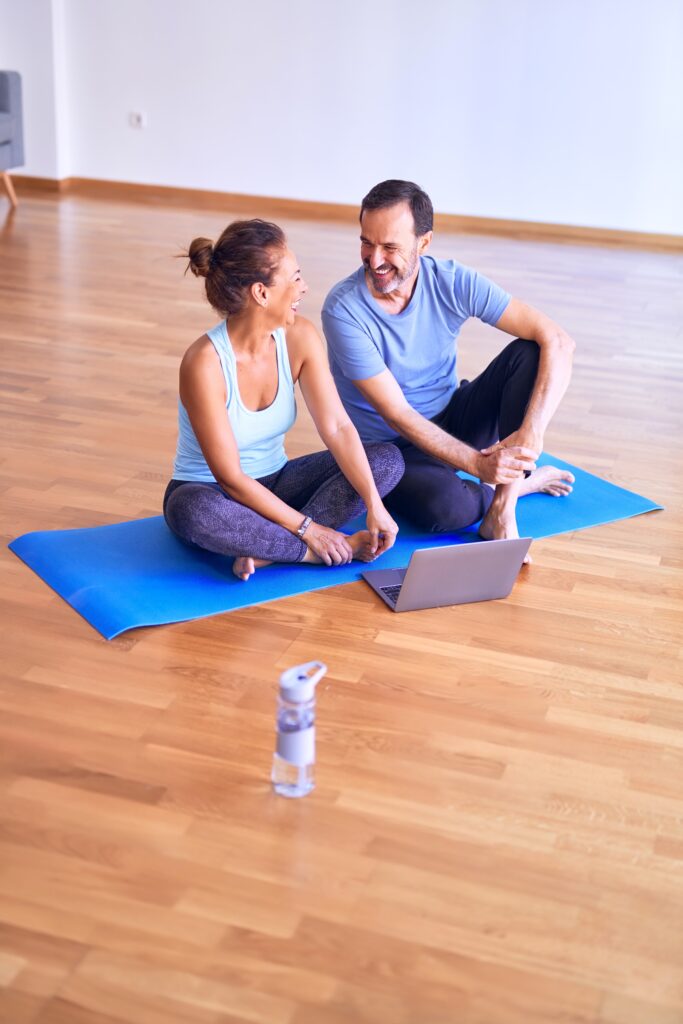
Is it Vertigo? Causes, Symptoms, and Treatment
Recently I woke up feeling a little tipsy. I turned my head a little and felt, well drunk, but worse. Usually when you open your eyes after exceeding your alcohol limit, the spinning ceiling goes away and you try to keep your eyes open until you fall asleep. Now, keep in mind, I am remembering these unfortunate experiences from my college days and I definitely felt triggered. On this particular day, I realized that something was incredibly off. Because a few friends had mentioned vertigo in the last month, I thought I might be suffering from the ailment.
Have you ever feel like the world around you is spinning, even when you’re standing still? If so, you may be asking yourself, “Is it Vertigo?”. Vertigo is a condition that affects millions of people worldwide, causing dizziness, nausea, and a loss of balance. In this article, we’ll explore what vertigo is, its causes, symptoms, and available treatments.
What is Vertigo?
Vertigo is a sensation of spinning or movement that can occur when you’re standing, sitting, or lying down. It can be caused by a variety of factors, including problems with the inner ear, brain, or sensory nerves. When you experience vertigo, it can be very unsettling and even scary.
Imagine being on a carnival ride that spins you around and around. When the ride is over, you may still feel like you’re spinning even though you’re standing still. That’s similar to what it feels like to have vertigo. However, vertigo can be much more severe and debilitating.

Causes of Vertigo
The most common cause of vertigo is an inner ear problem. I won’t bore you with the technical term, but it has to do with small calcium crystals in the inner ear become dislodged and move into the fluid-filled canals, causing dizziness and spinning sensations. I had heard people talk about the suffering involved with the condition, and had no idea how debilitating it can be until I had vertigo.
Other Causes of Vertigo
Meniere’s disease: A condition that affects the inner ear and can cause vertigo, hearing loss, and ringing in the ears.
Vestibular neuritis: An infection of the vestibular nerve, which connects the inner ear to the brain.
Migraines: A type of headache that can cause vertigo as a symptom.
Head injuries: Trauma to the head can cause damage to the inner ear or brain, leading to vertigo.
Symptoms of Vertigo
The main symptom of vertigo is a sensation of spinning or movement that can last for seconds, minutes, or even hours. Other symptoms that may accompany vertigo include:
Dizziness or lightheadedness
Nausea or vomiting
Loss of balance or unsteadiness
Blurred vision or difficulty focusing
Ringing in the ears or hearing loss
My experience included most of the symptoms and I found myself not able to function on any level. Watching TV or reading a book was out of the question as it made me more dizzy. After enlisting one of my kids to drive me to the Chiropractor, I got adjusted and he suggested I watch a YouTube video to get the crystals back to the proper spot in the inner ear. (Whisper – I could have saved $95 for that advice, although I love any excuse to go to the Chiropractor.)
YouTube was a good resource and my video choice included the same variables that I had at my disposal – me in my bed alone to manipulate my body to regain my life back. Some of the videos had someone helping and I didn’t have another person for help.
Famous Vertigo Sufferers
Many people have experienced vertigo, including the famous basketball player Kobe Bryant. Bryant suffered from vertigo during a playoff game in 2012. He described the sensation as feeling like he was walking on clouds and couldn’t find his balance. Despite the vertigo, Bryant continued to play and led his team to a win.
Diagnosis of Vertigo
If you’re experiencing symptoms of vertigo, it’s important to see your doctor. Your doctor can perform a physical exam to check for any underlying medical conditions or ear problems. They may also perform a test called the Dix-Hallpike maneuver, which involves moving your head into specific positions to evaluate for BPPV. Find a YouTube video like I did.
In some cases, your doctor may order additional diagnostic tests such as an MRI or CT scan to check for any problems with your brain or nervous system.

Treatment of Vertigo
The treatment of vertigo depends on the underlying cause of the condition. In some cases, vertigo may resolve on its own without any medical intervention. However, if your symptoms are severe or persistent, there are several treatment options available.
Medications can be used to relieve symptoms of vertigo, such as anti-nausea medications or anti-anxiety medications. Physical therapy can also be an effective treatment option, particularly for BPPV. Vestibular rehabilitation therapy involves exercises that help retrain your brain to compensate for the inner ear problem causing your vertigo.
It’s important to emphasize that surgery is typically considered a last resort for the treatment of vertigo, and it is not appropriate or necessary for all cases. Most people with vertigo can effectively manage their symptoms through non-surgical methods, such as medications, vestibular rehabilitation exercises, dietary changes, and lifestyle modifications.
The decision to undergo surgery for vertigo should be made after a thorough evaluation by a medical specialist, discussion of the potential risks and benefits, and consideration of less invasive treatment options. Additionally, the specific surgical approach and technique will depend on the individual’s diagnosis and unique medical history.
How to Avoid Vertigo
The strategies to avoid vertigo largely depend on the underlying cause of the condition. Vertigo can have various causes, and some are preventable, while others are not. Here are some general tips and preventive measures that may help reduce the risk of experiencing vertigo:
- Stay Hydrated: Dehydration can sometimes trigger or exacerbate vertigo. Ensure you drink an adequate amount of water throughout the day, especially in hot weather or when engaging in physical activities.
- Manage Stress: High stress levels can contribute to some types of vertigo. Practice stress-reduction techniques such as deep breathing, meditation, yoga, or progressive muscle relaxation.
- Limit Alcohol and Caffeine: Excessive alcohol and caffeine consumption can affect your inner ear and contribute to vertigo in some cases. Moderation is key.
- Get Enough Sleep: Sleep deprivation can make vertigo worse. Aim for 7-9 hours of quality sleep per night.
- Avoid Trigger Foods: If you have vestibular migraines, certain foods like aged cheeses, processed meats, and foods with MSG may trigger symptoms. Identify and avoid your trigger foods.
- Exercise Regularly: Engage in regular, moderate exercise to improve overall health and balance. Avoid overexertion, especially if you have a medical condition that can trigger vertigo.
- Use Caution with Medications: Some medications can cause or worsen vertigo as a side effect. Discuss potential side effects with your healthcare provider, and let them know if you experience dizziness or vertigo while taking any medications.
- Fall Prevention: If you’re prone to vertigo episodes that affect your balance, take precautions to prevent falls. Remove tripping hazards from your home, use handrails on stairs, and consider using assistive devices like canes or walkers if necessary.
- Stay Active: Maintaining an active lifestyle, including activities like walking and stretching, can help improve your overall balance and reduce the risk of falls.
- Limit Head Movements: If you have benign paroxysmal positional vertigo (BPPV), be mindful of sudden head movements, which can trigger symptoms. Slow, deliberate movements can help reduce the risk of vertigo episodes.
- Regular Checkups: Visit your healthcare provider for regular checkups to monitor your overall health and address any underlying conditions that may contribute to vertigo.
- Ear Protection: Protect your ears from loud noises, as exposure to excessive noise can contribute to hearing loss and inner ear problems, which may increase the risk of vertigo.
It’s important to note that these preventive measures may not apply to all types of vertigo, and the effectiveness of these strategies can vary from person to person. If you experience recurrent or severe vertigo episodes, consult a healthcare professional for a proper evaluation and diagnosis, as well as personalized guidance on managing and preventing your specific condition.
How Exercise Affects Vertigo
Exercise can have both positive and negative effects on vertigo, depending on the underlying cause of the vertigo and the type of exercise performed. Here’s how exercise can affect vertigo:

- Positive Effects:
- Vestibular Rehabilitation: Certain exercises, known as vestibular rehabilitation exercises, can be beneficial for people with certain types of vertigo, such as benign paroxysmal positional vertigo (BPPV) or vestibular neuritis. These exercises are designed to improve balance and reduce dizziness by promoting the brain’s ability to adapt to changes in the inner ear’s balance signals. A physical therapist can provide guidance on these exercises.
- Overall Health: Regular exercise can contribute to overall health and well-being, which may indirectly benefit individuals with vertigo. Exercise can improve cardiovascular health, reduce stress, and help maintain a healthy weight, all of which can have a positive impact on general health.
- Negative Effects:
- Exacerbation of Symptoms: In some cases, strenuous or high-impact exercise can exacerbate vertigo symptoms, especially if the underlying cause is related to certain medical conditions or medications. Vigorous physical activity can lead to increased dizziness, unsteadiness, and the risk of falls, particularly if balance is already compromised.
- Dehydration and Blood Pressure: Dehydration or low blood pressure, which can be triggered by exercise, may worsen symptoms in individuals prone to certain types of vertigo. Staying hydrated and being cautious about changes in body position during and after exercise can help mitigate these effects.
- Migraine-Related Vertigo: Some people with vestibular migraine may find that certain types of exercise or intense physical activity trigger their symptoms. In such cases, moderation and identifying specific triggers are essential.
It’s crucial for individuals with vertigo to approach exercise cautiously and consult with a healthcare professional, especially if they are unsure about how their specific condition might be affected. A healthcare provider can offer guidance on appropriate exercise regimens and help tailor an exercise plan that minimizes the risk of worsening vertigo symptoms. Additionally, individuals with chronic or recurrent vertigo should seek a comprehensive evaluation to determine the underlying cause and receive appropriate treatment. When I had my episode, I had to cancel all my classes and deskwork.
Summary
In summary, this condition is uncomfortable, serious and debilitating. We can make it better and we can make it worse. Exercise is not always the answer. My greatest caution for you is don’t let it go for too long and get medical advice if you feel like you can’t perform the Epley Maneuver on your own. Knowing the causes, symptoms and treatments will help you better answer the question, “Is it Vertigo?” and help you survive and recover.
About the Author

I am Kathy Denise Hicks, Corrective Exercise Specialist, Personal Trainer, and Author. I have spent a decade learning about the body, how it moves and how to teach others to heal their joints and muscles. Being out of pain and losing a few pounds is what many are looking for and I would love to connect with you to help you achieve your fitness and health goals. Correcting muscular imbalances can really help you feel better, look younger and be happier. If you are looking to get moving and feel younger with more energy, I have a program that can help. My 14 Day Workout Trial, will give you an idea of the classes I offer. Come and give it a try. Your next best move may be a click away.



